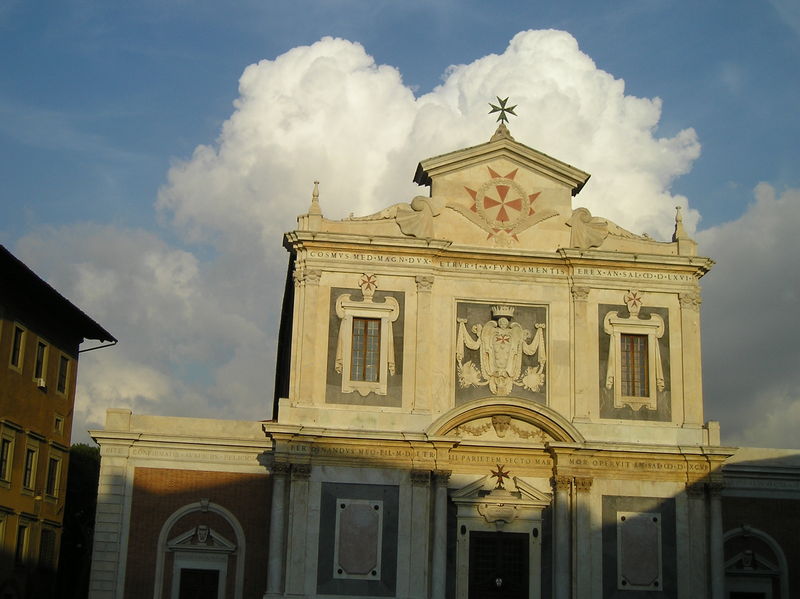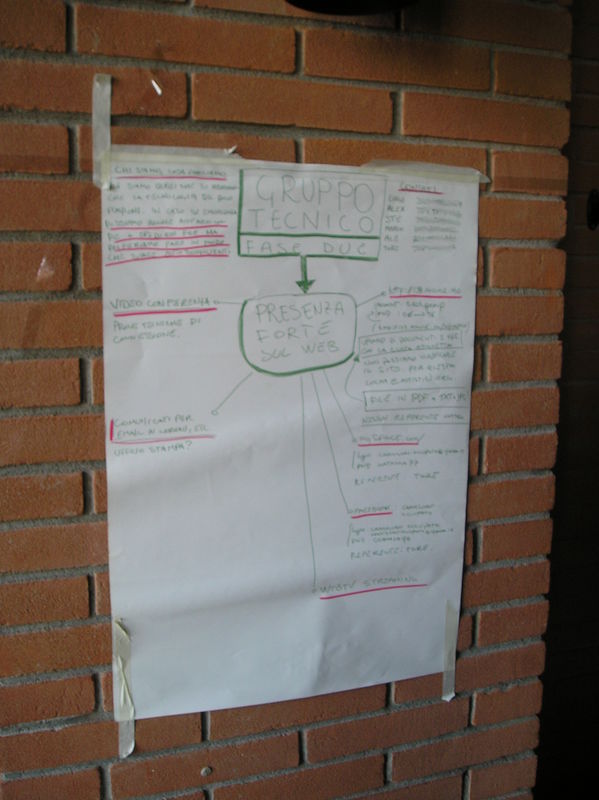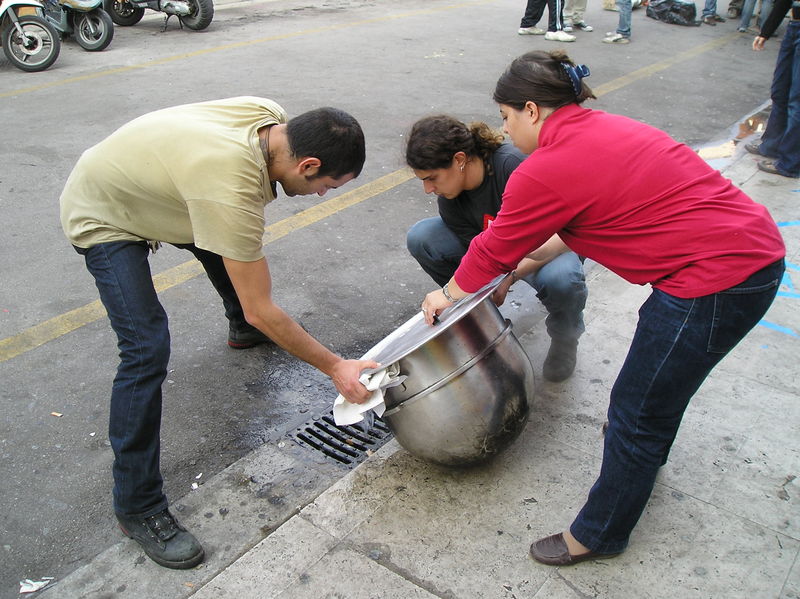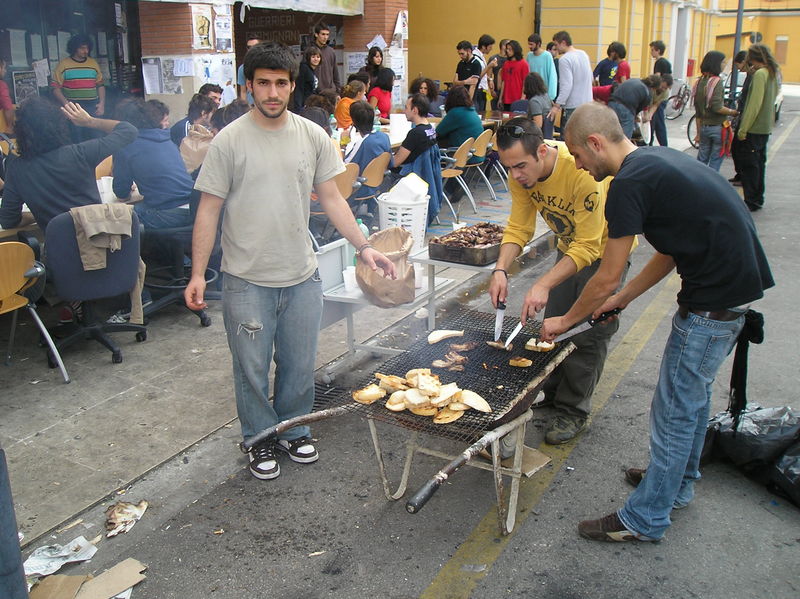After the critical mass, Stefania headed back to Florence, and I went to back to the social center. They were having some sort of special benefit event to pay for the fines levied after a group of antifascist activists disrupted a speech by a right-wing, anti-immigrant Italian politician named Borghezio.
There was a very nice communal dinner that included a pasta course, a meat course, a desert, and an aperitif. I ran into Angelo, one of the guys I’d met at the hackmeeting in Palermo. It turns out he lives in Pisa and studies mathematics at the University of Pisa. He generously volunteered to let me stay with him.
After dinner, there was a screening of video from the event that prompted the fund-raiser. Basically, from what I could tell on the video (which had clearly been heavily edited) Borghezio was speaking at an event in some building, and there were a lot of really loud, angry protesters around outside. The video wasn’t really that interesting. The shots of the protesters were all pixelated to shield their identities, which made it hard to watch. It was mostly just blurry crowds standing around yelling, banging on doors, windows and cars. There were confrontations with the police. Towards the end, Borghezio is hustled out of the building and flees the scene.
After the video, I played 3-on-3 basketball with some Italian guys in the courtyard. I think they assumed that because I was American, I would be better than I actually am. My defense was weak, and I was totally winded after about 5 minutes, but I made a couple layups, one decent jumper and some rebounds. Considering I haven’t played basketball in three or four years, I was quite proud of my performance.
There was also a concert with a DJ in the auditorium. It was a pretty cool, diverse crowd with a surprisingly wide variety of ages and ethnicities represented. Unfortunately, the DJ was pretty lame, it was boring, repetitive house music.
Both Angelo and I agreed on the general suckiness of the music. I asked if there was anything else going on that night. Pisa isn’t really much of a nightlife town, he informed me. But there might be something going on at the occupied University. I was 100% on board with that plan.
We stopped by Angelo’s place and I dropped off my bags, and then we walked over to the university.
It was probably around 1 am when we arrived. There were maybe two dozen people still awake, sitting around outside smoking, or inside drinking; talking. Two guys with acoustic guitars were performing duets of Italian folk songs and protest anthems; everyone else was singing along. There was a large collage taking shape, with photos and text clipped from various newspapers and magazines. The text underneath the picture of the kitten says something like, “This kitten wrote the new education law. You don’t hate kittens, do you?”
I asked if the collage represented any particular idea, or just anything that looked cool. I was told the latter. From a copy of Black Power International magazine (and gold background from a travel ad), I contributed the golden-haloed Barack Obama on the far right, which I thought was at least mildly clever given the near-messianic fervor surrounding our Presidential frontrunner.
To any American students reading, if you’ve ever really really wanted to do vodka shots in the registrar’s office, or drink a beer in your lecture hall, I suggest you occupy your university as soon as possible.
If there was a certain party/festival/sleepover atmosphere, I don’t mean to imply that the students weren’t serious about their political goals. In addition to holding a significant quantity of empty alcohol bottles, the former administrators’ office also held a great deal of paperwork generated by the students themselves. They were researching legislative options, communicating with the media, scheduling and organizing demonstrations, and further coordinating with the protesting high school students. They were writing and xeroxing fliers, leaflets and signs. Posters on the wall included clippings from media coverage, and a detailed explanation of the new law and its ill-effects.
I put off writing this post for a long time because I wanted to write something brilliant; something that really captured the feeling of the place. A sense of newness burdened by history. A mix of honest idealism and devil-may-care apocalyptic abandon. Excitement tempered by exhaustion.
A better writer than I might get it really right, but you’ll just have to take my word that it felt like something historically important might be occurring.
This feeling was not lost on the students themselves. Indeed, if anything, there was a level of self-consciousness among them that seemed at times to threaten their effectiveness going forward. It’s never good to be too aware of the potentially momentous impact of your actions.
I met a freshman physics major who told me that she was exhausted, but she didn’t ever want to go to sleep. She said she felt like she was experiencing history being made, and she didn’t want to miss a second of it. Over the course of the two days I stayed there, it seemed clear to me that the students in Pisa were acutely aware of their radical predecessors. In their sartorial choices and music selection, they seemed to be taking cues from both Latin-American revolutionaries and 1960s student radicals.
Jefferson Airplane’s “White Rabbit” and Pink Floyd’s “The Wall” played frequently.
At one point, a yellow bandanna tied around one guy’s bicep slipped off and dropped on the ground. I picked it up, “Hey, you dropped your bandanna,”
I said, handing it back to him.
“Oh, thanks,”
he replied.
“You wouldn’t want to be the only one without a bandanna,”
I joked.
“In the movement, you need to have one,” he answered with apparent seriousness.
Despite their affinity for bandannas, their movement is uniquely grounded in the 21st century. One of the first things they did was to establish a blog/website, complete with live webcam feed. The technology team had posted a detailed flowchart of goals, including a presence on MySpace and Facebook, video conferencing with students at other universities and a simplified system for students to upload photos to a communal Flickr account.
The students also upgraded the technology hardware as one of their first actions. Shockingly, there was no wireless internet in the building before it was occupied. Perhaps this is emblematic of the degree to which the university is underfunded. The students bought a wireless router and installed it in the main lecture hall. It was actually a really crappy router that seemed to drop the WAN connection about every couple hours or so. I felt kind of terrible for the student tasked with providing IT support for the activists. He spends half his life rebooting that router. He told me that a few nights previously, people had roused him out of bed at 4 am to fix the router. I was tempted to just buy him a new router.
After the first couple days, the administration shut off internet access in the occupied buildings. This is the 21st century version of throwing in tear gas canisters. There were special sub-protests (“Give me connectivity or give me death?”), meetings and internet access was eventually restored.
As the night wore on, Angelo suggested, “Hey, you wanna just sleep here tonight?” I believe my response was “Awesome”.
Now, we had to go back to Angelo’s place to retrieve our sleeping bags and such. The students had been locking the gates to the university at night and Angelo was concerned that if we left to get our stuff, they might lock the gates and nobody would be motivated enough to rouse themselves and let us back in. Then, he hit upon a brilliant social engineering hack to guarantee that we would be re-admitted.
There is a certain pastry shop in Pisa where the employees come in around 3:30 am to begin baking pastries for the morning. Although the shop doesn’t officially open until 6 am, it’s known among young people that if you hang around in the alley behind the bakery, you can usually buy pastries in the middle of the night.
Angelo found a small brown paper sack and went around to all the students at the university asking if they wanted these pastries, and collecting money from each of them. He promised that we would return with the pastries (and, coincidentally, our sleeping gear). We immediately became the two most popular people at the university. Two kids even volunteered the use of their bicycles, which we accepted.
We biked over to the alley behind the bakery. It was clearly a happening nightlife spot in Pisa, because there were already about a half-dozen people there ahead of us waiting for the shop to “open”. I felt irrationally sketchy hanging around in an alley with a bulging paper sack full of cash at 3:45 in the morning. After about 15 minutes, the back door opened and one of the bakers took orders. Angelo confessed to me that he’d only ever ordered one or two late-night pastries at a time, and wasn’t sure how the mass-order would go over. However, when we stepped up, Angelo asked if we could order 40 pastries (half creme-, half chocolate-filled), and the bakers didn’t seem fazed in the slightest. We handed over the contents of our cash-sack and waited for another 20 minutes for our order to bake. The bakers had some trouble packing all the pastries so that we could carry them while riding a bike, but a combination of tinfoil trays, paper wrappers and repurposed plastic garbage bags got the job done. We swung by Angelo’s flat and I picked up my sleeping bag and a change of clothes.
Returning to the university bearing fresh-baked pastries, the gates were opened and we were received like conquering heroes. Thus, one of the universal principles of university students the world over was reaffirmed: they LOVE cheap, unhealthy food in the middle of the night, and they’re lazy about going to get it themselves. This fact is the only thing keeping Mix Bowl in Claremont, California in business.
All forty pastries were devoured in a matter of a few minutes. I felt bad for the students who had somehow missed the boat on the pastry-ordering. They would trickle in in ones and twos, see everyone eating, and pick fruitlessly through the empty remnants of the packaging before wandering off, dejected.
Full of pastry, I suddenly got really tired. Most of the students were sleeping in the large lecture hall. In contrast to the stone or concrete floors found in most of the building, the lecture hall had relatively warm wood flooring. For novelty’s sake, I laid my sleeping bag out on the vacant lecture dais and quickly dropped off to sleep.
I woke up around 11 am, feeling refreshed, if a bit sore and stiff. Note to university administrators: when students are allowed to manage their own affairs, not a single event is scheduled earlier than 12 noon.
Many students were already preparing a communal breakfast/lunch. I’m continuously in awe of the Italians’ ability to cook good food for enormous numbers of people. This particular meal required the use of the largest pasta pot I’ve ever seen. It took three people to manhandle it out to the curb and pour the water off into the storm drain. Other students barbecued sausage and ribs on an improvised wheelbarrow-grill. Warm, low-grade supermarket beer also made an appearance.
After lunch, there was a really large meeting in the auditorium for local high school students. In addition to trying to organize themselves, the University of Pisa served as an organizing focal point for several local high schools. I was impressed by the turnout among the high school students, mostly filling the large lecture hall (perhaps a thousand seats). The high school students seemed to be diverse in both age and level of attentiveness. Those in the back chatted and flirted like they were still in class, while, near the front, their peers (assisted by a few university students who seemed to be deliberately trying to stay out of the middle of it) debated and deliberated. If the university students were copping Latin American revolutionaries and 1960s radicals, the high school students were taking their cues from the university students: an imitation of an imitation.
Late in the afternoon, Angelo suggested we go back to his place to shower and relax a bit before a meeting he described as “important” that evening. Apparently the student activists had secured an audience with the University Senate (I get the impression this was sort of equivalent of the Board of Trustees at an American university), an administrative body that includes one or two token student members. The meeting at the university that night was to decide on what to present to the University Senate.
This meeting got going around 9 pm and went on for a long time. Many students seemed quite agitated and angry at times. Afterwards, talking to one of the girls who had been one of the leading participants in the discussions, she told me that the meeting had been incredibly frustrating and very little had been decided. The vast majority of the debate was over how decisions should be made. Early on, the student activists had rejected majority-voting as a decision-making method in favor of agreed consensus. But that was in the first few days, when it was a relatively small group of people. At the time I arrived, the University of Pisa had been occupied for eleven days. Now, with a lecture hall audience of several hundred, many of the newcomers had been demanding to know why no votes were being taken.
I shared my view that while consensus-agreement might be a more ideal decision-making method; when dealing with groups larger than a dozen or so, it simply wasn’t practical.
It was clear to me that most of the students were very committed and sincere, doing the best they could, but failing at times. For example, the group in charge of press contact had forgotten to call reporters about the critical mass event. So no reporters were present to preserve the text of my stirring oratory for posterity. Watching the students discuss, debate, argue and explain, I had the feeling that it might all be for naught; that the real decisions were being made by people in power, people who weren’t paying attention and wouldn’t have cared even if they had been. When asked about the student demonstrations, the education minister was quoted as giving a one-line answer, “I don’t understand them.” These pessimistic thoughts made me feel very old and very cynical. I couldn’t honestly say what more the students should be doing.
However, by the end of the frustrating meeting, I wasn’t the only one with a dim view of the future of the students’ movement. Angelo said he wasn’t sure what would happen next. He told me that the science and math departments were having their own meeting on Monday, to talk about taking action independently of other groups. The girl I talked to earlier told me that she was going home to take a shower and sleep in her own bed for the first time in eleven days, but vowed to return.
Angelo and I also retired to his flat for the night, and I slept on a real mattress. We also watched Italian Spiderman.
Visiting the student activists in Pisa was one of the coolest experiences I’ve had on this trip so far. At times, I felt like an interloper, an outsider, a tourist. While I may feel strongly about education funding, this wasn’t my fight. However, Angelo later told me that he felt like talking to me, explaining the issues to me as an outsider actually helped them clarify their own thinking. And once, when I was walking to the bathroom, a guy stopped me, “Hey, weren’t you at the critical mass? I heard what you said, it was good. Thank you.” So that was quite gratifying.





Sooooo, Welcome to the sixties!
Sorry to nitpick, but it’s “fazed” not “phased”.
Wow. That was a really amazing blog. I know you said that your life wasn’t as exciting as your website made it seem (all apologies for butchering a Futurama quote in paraphrasing), but after this I have a hard time believing that. You’ve gotten to see and do some pretty incredible things in the last months. These are the kinds of stories you can tell people about 40 years from now and have them still be interesting.
Keep writing, dude. I’ll keep reading.
~Steve
ONDA 1 – il consenso « Emigration for Dummies // Oct 18, 2009 at 4:21 pm
[...] quel tipo americano di cui forse qualcuno si ricorderà parlare al megafono in piazza dei Mircaoli. Qui i suoi ricordi del [...]